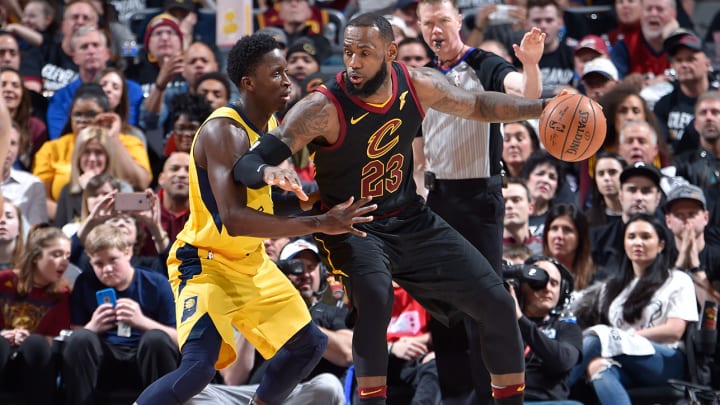Pacers Earn the Wrath of a Resolute LeBron James

There is a cruel lot reserved for those who draw the full attention of LeBron James. Many teams will never know it. James is so cerebral and so physically imposing as to dominate games at a jog, summarily dispatching all but the most elite competition. Early in a playoff series, he tends to slow-play an opponent solely because he can. James takes the opening game to find his spots, all while gently guiding his teammates into their own rhythm.
This bout with the Pacers is different. It took all of a quarter in Game 1 for the stakes to be raised. By the end of four—and an upset over the presumed Eastern Conference champions—it was clear that Indiana would demand far more of James than anticipated. Judging by his performance from the opening tip of Game 2, James concurred.
Gone was the breezy, feel-out-the-defense LeBron, his patient surveying replaced by lethal drives. He attacked Thaddeus Young off the dribble to set up a floating jumper. Myles Turner, after being pulled out to the perimeter on a switch, could only watch as James cruised past him for a reverse layup. Then came the turnarounds from the post, the confident three-pointers and the slice down the middle of the lane in transition. When he applied the punctuation to his opening statement, the Pacers found themselves down 16-1—every point of which came courtesy of James.
Carlos Boozer and Nate Robinson Reveal Their Toughest NBA Matchups
This was the LeBron that overwhelms. The LeBron that leaves no doubt. Part of what separates James from his peers is the distinction of his full investment. There's something admirable in how hard Victor Oladipo plays every possession, but there's something terrifying in the way LeBron doesn't. Any team that gets the better of the Cavs—as the Pacers undeniably did in Game 1—must know that the hammer will drop. And when it does, history shows that all but a few teams will crumble.
James, naturally, did not stop at 16. His push continued through the quarter and into the second, punishing whichever defenders were put in his path. After one of his drives against Turner ended in an errant layup, he rose high above the rim on the next for a dunk that erased any margin for error. There is much to applaud in the command that LeBron brings to a playoff series. No player in the league more deftly solves problems in real time. Yet when James shrugs off the weight of tactics and reduces the game to a singular focus, every edge of his game becomes a weapon. A forceful LeBron, even at 33 years old, is the closest thing the NBA has to an unstoppable scorer.
This was an achievement even by his own lofty standard. James had played in 218 postseason games before Wednesday. By halftime of Game 2, he had outscored half of those performances while shooting 12-of-16 from the field. By game's end, James totaled 46 points (his fifth-highest-scoring playoff game ever), 12 rebounds and five assists—all to narrowly avoid the fate of losing the first two games of the series at home.
The Peaks and Valleys of LeBron James in Cleveland
The mortality of the Cavs is clear as day. Not only did Kevin Love (Cleveland's second-best player by a mile) shoot 31% from the field, but he tweaked an ankle, took a hit to the knee and was forced to exit the game in the final, climactic minutes with a hand injury. George Hill has been invisible. J.R. Smith, who moved into the starting lineup on Wednesday, was a mistake factory. Jordan Clarkson, Rodney Hood and Jeff Green have given the Cavs next to nothing. Only a single one of LeBron's teammates (Kyle Korver) carried their role in this critical game, underlining just how self-destructive Cleveland can be whenever its best player takes his periodic rest. That all the good LeBron did in 40 minutes could nearly be undone in eight speaks to the gravity of the competition.
This is a team that cannot win without James working at herculean levels, and—as they showed in Game 2—could well lose anyway. With just 27 seconds remaining in a three-point game, the Cavs completely lost track of Oladipo, the highest-priority opponent on the floor. His game-tying attempt caught rim and bounced away to Cleveland's relief. “We got lucky," James conceded, offering proof that even good luck can be damning.

Rob Mahoney is an NBA writer dedicated to the minutiae of the game of basketball, its overarching themes and everything in between. He joined the Sports Illustrated staff in 2012.